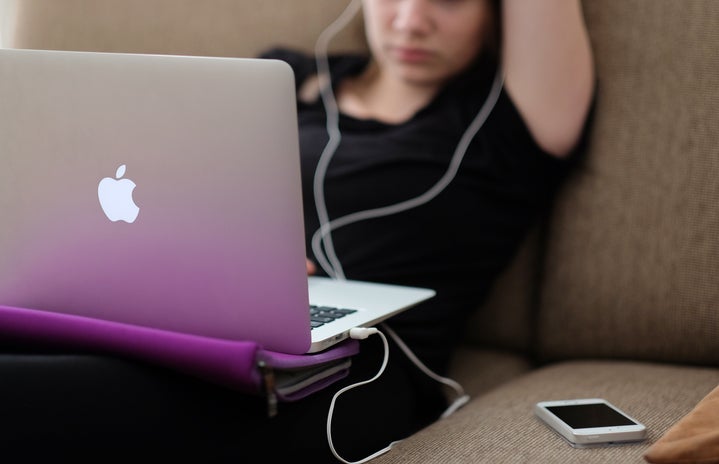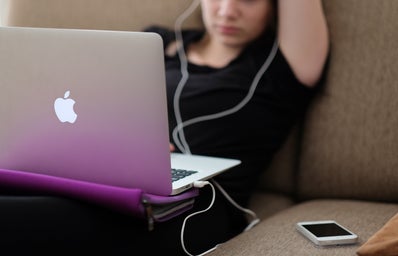If you’re a student right now, I’ll make the bold guess that you’re a little too familiar with battling what I like to call the “11:59 Complex.” This concept, which has just been exacerbated by the pandemic, describes the ease with which we disassociate ourselves from the value of work and finish our assignments right before the deadline, like robots.
Once classroom lectures become videos watched at 1.25x speed and getting together to work with classmates becomes a mere click on “Join Breakout Room 1,” it’s normal to experience a change in the motivation that previously drove your hard work.
The good news is that you’re definitely not alone; in fact, if you feel this way, you’re in the majority. The even better news is that there are small, easy tweaks you can make to your routine to reverse the effects of the 11:59 complex.
- Remember…
-
…the most daunting part of doing work is thinking about how much you have to do and how long it will take before you begin. Recently, I even procrastinated walking to the post office to ship a return for an online clothing order – an order I also procrastinated placing – for two weeks. The thought of walking to the post office in the cold, having to figure out where to put my order, where to pay, and how to correctly place the label all seemed like things I could do “tomorrow.”
Well, the “tomorrows” added up, and then I had about three days until my 30-day return deadline expired. I hauled myself out of bed, into the cold, and through the doors of the post office, where it took me a grand total of thirty seconds to drop off the return. I felt the weight of three ill-fitting pairs of jeans lift off my shoulders and laughed at myself.
Why didn’t I just do that earlier?
The same situation is often the case with schoolwork: sending that one email, completing that one Canvas module, signing up for that one office hour can be so intimidating, as silly as that seems; that one “thing” always gets pushed until “later,” and then suddenly it’s crunch time, and there actually is reason to be stressed.
Don’t draw out the stress. You’ll feel so much better doing what you need to do now, and you may even laugh at yourself about how easy it ended up being. It will never get done until you start it, so take baby steps – even for huge assignments, opening your computer is the hardest part.
- Ditch the bed…
-
…when you’re working. If you could sit at a desk for seven hours in school for 12+ years, you can move to a table or desk for a couple of hours a day to tune in to Zoom classes or do homework. The hard part is getting your mind there, along with your body.
A simple Google search of “doing homework in bed” will show you hundreds of pages of proven science that assignments done in your bed will not be your best. The American College of Healthcare Sciences names three central reasons not to work in your bed: it limits your focus, hurts productivity, and messes up your sleep schedule. There are few feelings worse than waking up and realizing you fell asleep midway through an assignment due in a few hours. It’s easy to avoid this stress – work away from your bed.
Once you make this change, you’ll also sleep better, which will make you a more efficient worker.
- Find a study buddy…
-
…to keep you motivated (and you can do the same for them!). Whether you’re studying together or working silently in each other’s company, having a witness to your productivity often increases your motivation.
A few weeks ago, I spent hours in my room working on an essay, constantly getting distracted by anything I could find to distract myself with. I relocated to a study lounge with my roommate, and the combination of changing the scenery and having another worker next to me spurred my progress – I got more done in a half hour there than I would have in three hours in my room. Some days, it works to be alone and grind, but other days it doesn’t. On those off days, grab a partner for some external motivation.
- Use one screen at a time…
-
…to do your work. While it can be hard to part from Tik Tok and Instagram, it’s worth it to feel the spark of motivation you thought was lost forever. Putting the phone down, even if it’s just for small increments at a time, will exponentially increase your productivity and focus.
A study found that students who took tests with their phones on their desk did worse than students who put them in a pocket. Dr. Adrian Ward, a cognitive psychologist and associate marketing professor, also studied the negative effects smartphones have on studying – lowered learning, reasoning, abstract thinking, and creativity. Leaving your phone on your bed requires minimal effort in exchange for great improvement.
- Adjust your old study habits…
-
…to fit your new schedule. It’s unrealistic to expect yourself to study in the same way you used to pre-pandemic; fewer study resources are available right now. Maybe you can’t go to your favorite library or coffee shop to work, but don’t let all of your old good habits slip away.
A habit I’ve resurrected is creating a daily checklist, which has lowered my stress and heightened my motivation. I outline exactly what I expect myself to get done, and checking things off my list serves as a helpful visual of my productivity during the day.
Maybe you used to make tailored study guides, order a certain coffee to study with, or listen to specific music while working. Bring back part of your old study routine to get yourself in the groove again and remind yourself how good it feels to work hard.
Any of these changes to your study routine will give you a boost in the struggle against the 11:59 complex. Remember, we’re all in the same boat, and it’s okay to not be as motivated as you were before. Support those around you, and feel supported – you aren’t alone, and you can be motivated again!


